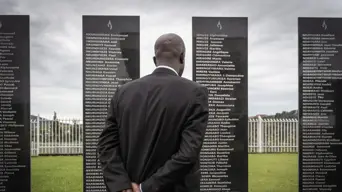Last Rwanda genocide fugitives sought by int'l court confirmed dead
However, more than 1,000 genocide suspects being sought by national authorities remain at large, the chief prosecutor for the International Residual Mechanism for Criminal Tribunals (IRMCT), Serge Brammertz, said.

FILE: Remy Kamugire, local vice president of Ibuka (a survivor organisation) walks next to victims' names displayed on pillars at the Murambi genocide memorial, Nyamagabe, southern Rwanda on 21 April 2022. Rwanda will on 7 April 2024 commemorate the 30th anniversary of the genocide during which Hutu extremists targeting the Tutsi minority slaughtered around 800,000 people in a massacre lasting 100 days. Picture: Simon WOHLFAHRT / AFP
KIGALI - Ryandikayo and Charles Sikubwabo, the two last remaining fugitives wanted by an international court over the 1994 genocide in Rwanda, have been confirmed dead, prosecutors said Wednesday, more than 25 years after their demise.
However, more than 1,000 genocide suspects being sought by national authorities remain at large, the chief prosecutor for the International Residual Mechanism for Criminal Tribunals (IRMCT), Serge Brammertz, said.
Ryandikayo and Sikubwabo were indicted by the International Criminal Tribunal for Rwanda (ICTR) in November 1995 on charges relating to the genocide, which saw around 800,000 people, most of them Tutsis but also moderate Hutus, slaughtered by Hutu extremists.
The charges included genocide, complicity in genocide, conspiracy to commit genocide, murder as a crime against humanity, extermination as a crime against humanity among other crimes committed in Kibuye prefecture on the shores of Lake Kivu.
The IRMCT prosecutor's office (OTP) said it "has accounted for all fugitives" indicted by the international tribunal for crimes committed during the 1994 genocide.
"Following a comprehensive investigation, the OTP was able to conclude that Sikubwabo passed away in N'djamena, Chad, in 1998 and was subsequently buried there," it said in a statement.
Ryandikayo fled to the Democratic Republic of Congo - then Zaire - where he "passed away in 1998, most likely due to illness, sometime after arriving in Kinshasa", it added.
Sikubwabo, who served as mayor of Gishyita in Kibuye, was accused of leading attacks and participating in massacres that culminated in the murder of thousands of Tutsis.
After the Tutsi-dominated Rwandan Patriotic Front rebel militia took over Kigali in July 1994, Sikubwabo fled to the DRC and travelled through African nations before arriving in Chad in 1997, the prosecutor's office said.
A local businessman, Ryandikayo was also accused of instigating massacres against Tutsis, with thousands killed in Gishyita and nearby Bisesero.
After he escaped, he travelled to Kinshasa to join an ethnic Hutu militia, the prosecutor's office said.
"Even as we mark the conclusion of the search for the last ICTR fugitives, it is critical to remind ourselves that there are still more than 1,000 fugitive genocidaires who are sought by national authorities," Brammertz said.
"Locating them will be a challenge."
The IRMCT was set up under a 2010 UN resolution to complete the work of both the international Rwanda court and the International Criminal Tribunal for the former Yugoslavia.